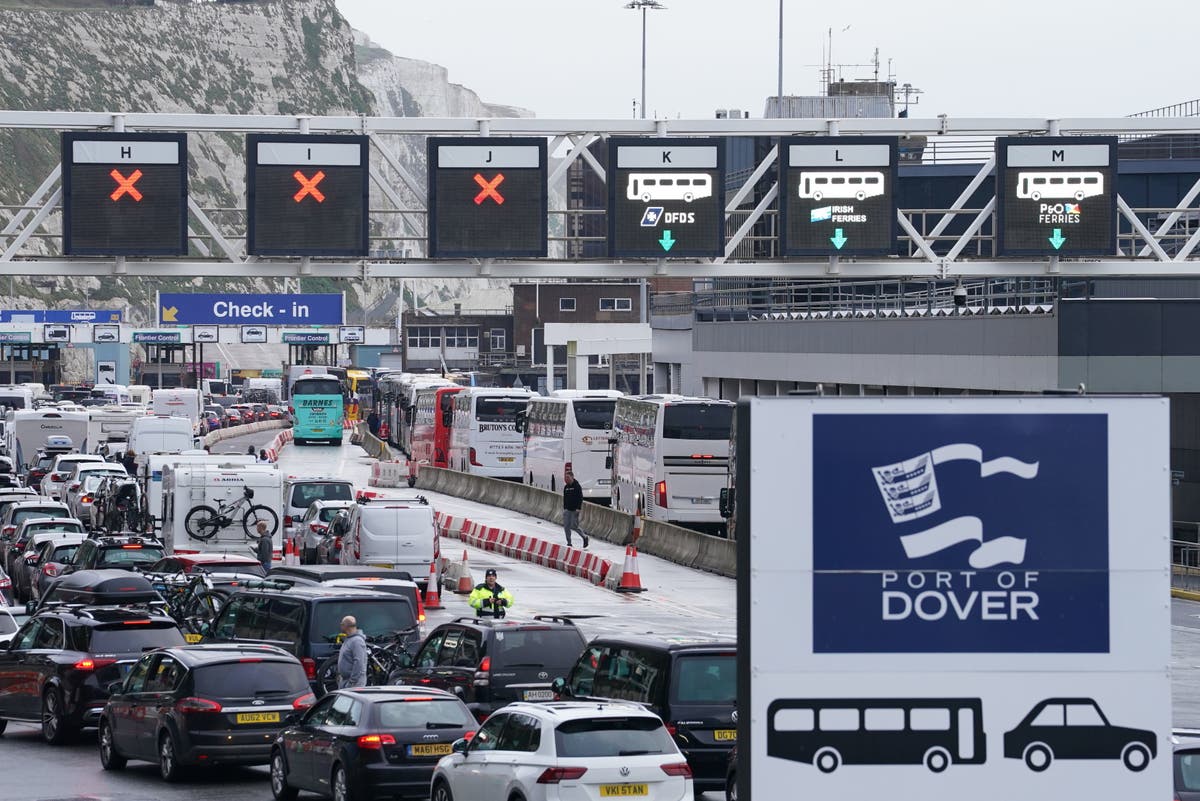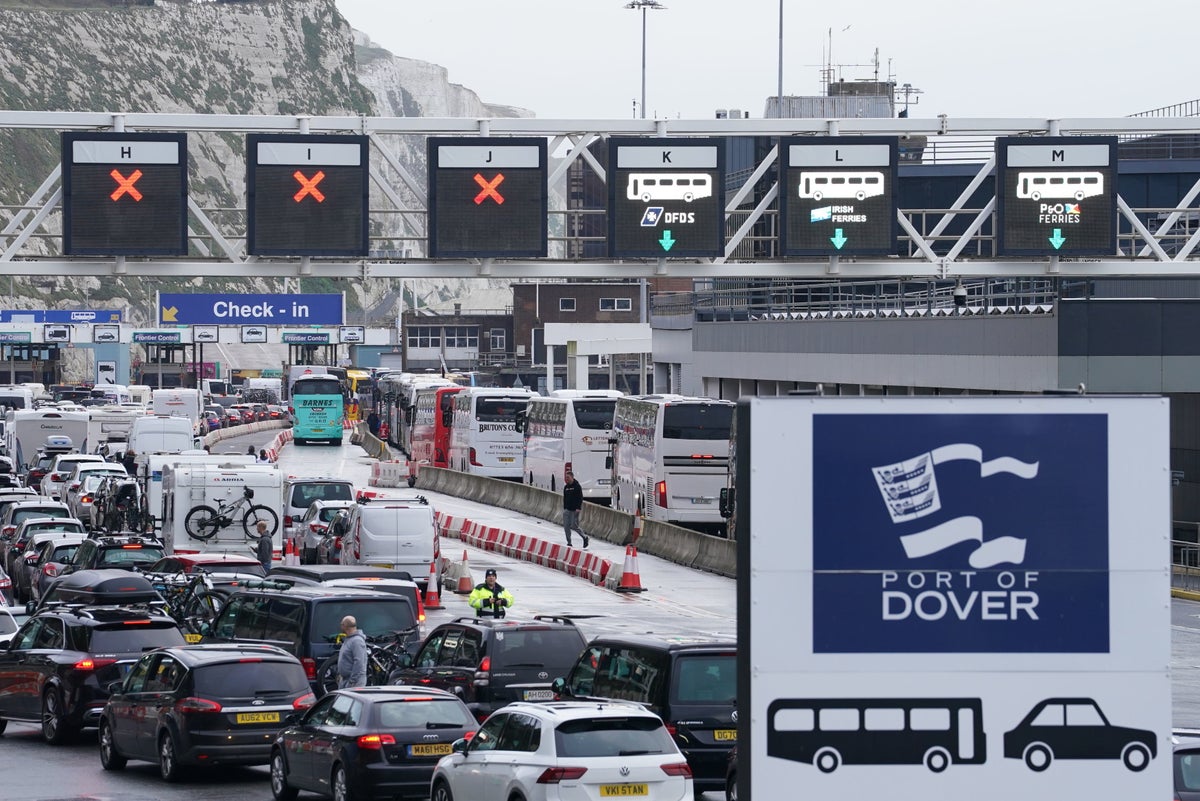As many as 20,000 coach passengers hoping to sail from the UK’s leading port to Calais and Dunkirk this weekend have endured extremely long waits at Dover – in some cases up to 18 hours – before departing by ferry to France.
The delays coincided with the start of the Easter holidays for many schools, which brought a surge of coaches to the Kent port
The Port of Dover declared a Critical Incident and says it “has been working round the clock with the ferry operators and border agencies to get coach passengers on their way, with extra sailings being put on overnight to help clear the backlog”.
There is no longer any backlog of cars and trucks, but the statement from the port added: “There remain pockets of coaches still waiting to be processed with smaller volumes of coaches expected today.”
The leading ferry operator, DFDS, said it was “still working through the backlog of coach traffic, but numbers arriving today are reducing so they hope to be in a better position later today”.
Some 300 coaches departed from Dover on Saturday, with 140 more expected to sail on ferries on Sunday.
What caused the problems?
Poor weather and delayed ferries on Friday and Saturday may have had a marginal effect, but according to the boss of the Port of Dover, the main issue has been passport control for France.
For the past 20 years, the frontier with France has been “juxtaposed,” with Police aux Frontières stationed in Dover and Folkestone, and UK Border Force staff in Calais and Dunkirk.
Until 2021 there was a “light touch” approach, with many vehicles simply waved through. Even if the French officer did look, the only formality for British citizens was a simple verification check: “Is this a valid EU travel document, and is this the holder?”.
But the UK signed up for a hard European Union border to be installed with our nearest Continental neighbour – like those that the EU has with Russia and Turkey.
Every UK passport holder – which makes up two-thirds of Dover’s tourist traffic – now has their passport examined and stamped.
The Port of Dover said the latest gridlock was caused by “a mix of lengthy immigration processes at the border and sheer volume of traffic”.
DFDS said: “The company is very sorry that passengers travelling this weekend have experienced such long delays at passport controls.”
So is it a Brexit consequence?
Not according to the current and previous prime ministers, commenting last July when families heading abroad on summer holidays encountered gridlock.
Rishi Sunak told the French “to stop blaming Brexit and start getting the staff required to match demand”. Liz Truss, who was to become prime minister six weeks later, said: “We need action from France to build up capacity at the border to limit any further disruption for British tourists and to ensure this appalling situation is avoided in future.”
They are now joined in dismissing the changes after leaving the EU as a cause by the Home Secretary, Suella Braverman. She told Sophy Ridge on Sunday on Sky News: “I don’t think it’s fair to say that this is an adverse effect of Brexit.
“It’s a very busy time of year and there’s been some bad weather.
“We’ve had many years now since leaving the EU, and there’s been on the whole, very good operations and processes at the border.”
Coaches wait to enter the Port of Dover in Kent after extra sailings were run overnight to try and clear the backlog
(PA)
Is the home secretary correct?
Suella Braverman said it had been “many years now since leaving the EU”. For practical purposes, the UK left the European Union in January 2021, ie two years and three months ago.
She went on to say “there’s been on the whole, very good operations and processes at the border”. But for the first 19 weeks of that year international leisure journeys from the UK were illegal under draconian Covid travel restrictions in the UK and abroad in place until March 2022. There were relatively few holidays planned by ferry for Easter that year as school trips had virtually vanished as a result of Covid.
The first contact of peak demand was in July 2022, when – at the start of the main summer holiday a surge of outbound families combined with delays in French officials reaching their border posts in Dover, created gridlock.
As we discovered over the first weekend of April, as well as last summer, it is impossible to process travellers at anything like the same rates as before Brexit.
A family of four in a car takes 90 seconds to pass through French immigration, according to Doug Bannister, chief executive of the Port of Dover. Previously, the encounter would last just a few seconds.
Scaling up to a 53-seat coach, the time taken represents 20 minutes per vehicle. Demand on Saturday amounted to around one coach every five minutes, and there is not space for four coaches to be checked at the same time.
So could every holiday peak bring gridlock?
Not according to the Home Secretary. She insists: “I don’t think this is the state of affairs to go forward.”
After the experience at the start of April, some travellers will move to other ferry routes, such as DFDS from Newhaven to Dieppe or Brittany Ferries from Portsmouth, Poole and Plymouth to a range of French and Spanish ports. Others will abandon coach and car travel and fly instead.
Passengers by their coaches as they wait to enter the Port of Dover in Kent after hours-long delays
(PA)
What about Dover itself?
The Port of Dover has an extremely constrained location beneath the White Cliffs with no room for expansion, which means that little can be done in terms of infrastructure. So the answer is in limiting the number of people passing through.
Most likely: rigorous controls will be introduced to limit the number of cars and coaches hoping to depart from Dover.
There is an analogous problem at the Eurostar terminal at London St Pancras International, from which trains depart to travel through the Channel Tunnel to Paris, Brussels and Amsterdam. The departure area simply does not have enough space to handle pre-Brexit numbers of passengers.
Eurostar solved that problem by sharply reducing the number of passengers it will allow on trains, particularly at peak times.
I predict the same will happen on the ferries (and Eurotunnel, which takes vehicles from Folkestone to Calais), with the Port of Dover imposing limits at peak times. Expect capacity caps to be mandated by the Port of Dover.
What will that mean for passengers?
Less choice and higher prices. Any reduction in capacity will, as Eurostar has shown, lead to an increase in fares.
Easter travellers were caught out by delays of up to 18 hours at Dover
(PA)
Any other solutions?
New or reinstated ferry routes from other British ports could help, such as Ramsgate to Ostend or Harwich to Bremerhaven. But these are unlikely to become available in the short term.
And longer term?
From late 2023 or 2024, the UK will, as requested, become subject to the new EU Entry-Exit System – which will gum things up still further. Facial biometric and fingerprints will be required from every visitor to the EU. Mr Bannister at the Port of Dover says the average processing time for a car could rise from 90 seconds to 10 minutes.
The new rules will not apply to EU citizens.



More Stories
Everything you need to know about July and August rail industrial action
‘It’s cancerous’: How seaside towns fight back against second home owners
EasyJet flight diverted after passenger medical emergency on board